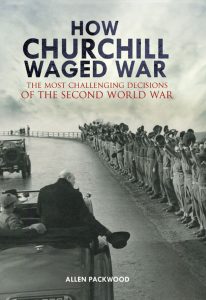
Bulletin #127 – Jan 2019
Unconditional Surrender

The President and the Prime Minister at the Casablanca Conference, January 1943
January 6, 2019
By WINSTON S. CHURCHILL
In his brilliant new study How Churchill Waged War, Allen Packwood analyzes the decision made by the Allied leaders seventy-six years ago this month at Casablanca to accept only the “unconditional surrender” of Germany, Italy, and Japan. Churchill wrote about this in the third volume of his memoirs The Hinge of Fate. The following extracts make clear his views.
The use of the expression “unconditional surrender,” although widely hailed at the time, has since been described by various authorities as one of the great mistakes of Anglo-American war policy. It requires to be dealt with at this point. It is said that it prolonged the struggle and made recovery afterwards more difficult. I do not believe that this is true.
My principal reason for opposing, as I always did, an alternative statement on peace terms, which was so often urged, was that a statement of the actual conditions on which the three great Allies would have insisted, and would have been forced by public opinion to insist, would have been far more repulsive to any German peace movement than the general expression of “unconditional surrender.”
I remember several attempts being made to draft peace conditions which would satisfy the wrath of the conquerors against Germany. They looked so terrible when set forth on paper, and so far exceeded what was in fact done, that their publication would only have stimulated German resistance. They had in fact only to be written out to be withdrawn.

2025 International Churchill Conference
Finally, I said in the House of Commons on February 22, 1944:
“The term ‘unconditional surrender’ does not mean that the German people will be enslaved or destroyed. It means however that the Allies will not be bound to them at the moment of surrender by any pact or obligation. There will be, for instance, no question of the Atlantic Charter applying to Germany as a matter of right and barring territorial transferences or adjustments in enemy countries. No such arguments will be admitted by us as were used by Germany after the last war, saying that they surrendered in consequence of President Wilson’s ‘Fourteen Points.’
“Unconditional surrender means that the victors have a free hand. It does not mean that they are entitled to behave in a barbarous manner, nor that they wish to blot out Germany from among the nations of Europe. If we are bound, we are bound by our consciences to civilisation. We are not to be bound to the Germans as the result of a bargain struck. That is the meaning of ‘unconditional surrender.’”
It cannot be contended that in the closing years of the war there was any misconception in Germany.
Subscribe
WANT MORE?
Get the Churchill Bulletin delivered to your inbox once a month.





